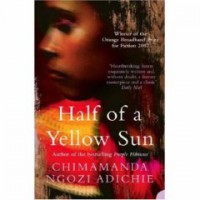
Written by: Chimamanda Ngozi Adiche
Submitted By: Dave Roffe
Half of a Yellow Sun by Chimamanda Ngozi Adiche is, without question, the finest novel I've read so far last year, and I'll be very surprised if I read anything as good in 2008. HOAYS is the story of three individuals during the late 1960s when a section of the Nigerian populace broke away with the intention of forming an independent state-Biafra. The Igbo tribe had previously attempted a coup against the controlling Nigerian Government and was suffering horrific reprisals as a result-hence the need for autonomy. The Biafran state lasted until 1970, largely as a consequence of lack of international recognition and suppression by the more powerful Nigeria, with whom it had been at war during the total time of its short-lived existence. Because of a series of catastrophes-some of them natural, such as crop failure, and others avoidable-the deliberate and wicked blockade of humanitarian relief, Biafra suffered a famine the scale of which was colossal, even in Africa's tragic history. Adiche does turn a baleful and accusatory glare in the direction of the British government, whom she regards as culpable in prolonging Biafra's agony, through colonial self-interest and complicity with Nigeria. African long entrenched tribalism also ensured that a political settlement was unlikely to be achieved before much bloodshed and many atrocities.
Against this backdrop the lives of the three main characters intersect: Ugwu, an uneducated house boy; Olanna, a middle class Ogbo young woman; and Richard, a reticent Englishman who has a fractious though loving relationship with Olanna's sister. The early optimism of the newly formed Biafran state turns from elation to disillusionment as the early idealism is compromised, with nepotism and corruption quickly replacing that idealism and integrity. The prospect of famine, looming like a plague as dark and hateful as the ubiquitous African black flies, looms apocalyptic and ever closer. The Nigerian soldiers openly brutalise the Biafrans-both military and civilians-and the Biafrans respond with equal cruelty and barbarity in such a way the cycle of violence is self perpetuating and seemingly unbreakable. The original aims of both sides of the conflict become buried beneath the mud and slaughter-these aims being the Biafrans' wish for independence; and the Nigerians' aim to quell what they regard as insurrection. The passages describing the starvation of schoolchildren are almost too traumatic to read.
A particular strength of HOATS is the way in which the characters grow and develop at the same pace at which the events steamroll towards a dreadful and inevitable finality. The more we care about these people, the greater the likelihood that some, if not all of them, will perish in the famine. The charcterisation is faultless. Ugwu, for example, is a simple well meaning young man who is press-ganged into joining the Biafran Army. As a result he becomes dehumanised and takes part in an appalling act. Whether he redeems himself later is deliberately left ambiguous.
The moral weight of each argument for and against the legitimacy of the newly established state is carefully measured and analyzed with the kind of inellectual intensity brought to bear by an author supremely capable of putting the tragedy of Biafra in an authoritatively historical context. The middle class and educated Biafrans express differing viewpoints about the ethical, social and economic case for war and independence. However, these opinions are often at odds with those who are otherwise in broad agreement about the validity of the cause. This, in my view, is what only gifted novelists are capable of doing: putting forward varying and often contradictory viewpoints and cogently arguing the case for each, in such a way that the reader is left unsure what position the author herself adopts-if indeed any.
Half of a Yellow Sun refers to the symbol of Biafra, worn by the Biafran soldiers.
Of all the many books I've read about Asia and Africa over the last few months, Half of A Yellow Sun stands peerless. It succeeds brilliantly on every level: it is informative, funny, heartbreaking, politically astute and poignant.
A masterpiece.

